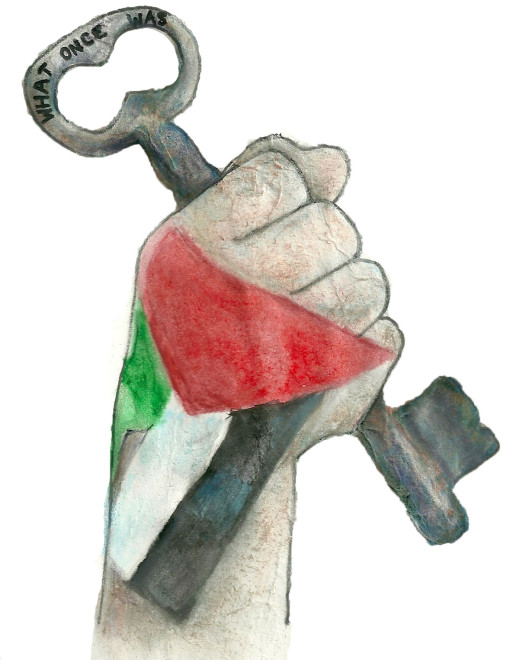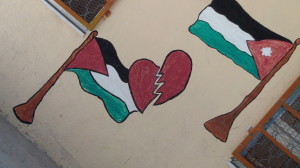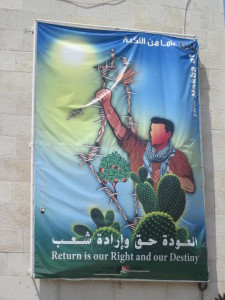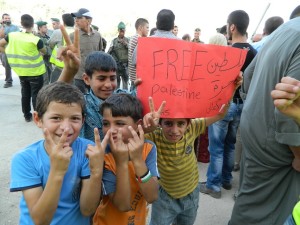Palestinian Right of Return: What Once Was
“Us Palestinians in Palestine, we’re not fighting for ourselves. We fight for our brothers and sisters abroad, the diaspora. We’re fighting their fight, so they can return to our homeland.”
Palestinian activist speaking to me about nonviolent resistance–Beit Ummar, West Bank.

I lived in the West Bank and Jordan for most of this past summer. I participated in non-violent activism in Palestine and worked with (read: played with) children on a digital media program in a Palestinian refugee camp in Jordan. I was tear-gassed in the former and ate popsicles with kids in the latter. In three short months, I got a hands-on crash course on the Palestinian condition. Wherever I went, there was one ubiquitous and unavoidable issue: the right of return.
The Universal Declaration of Human Rights (UDHR) states that civilians maintain the right to return to the homes from which they fled in wartime, and that no one may prevent them from doing so. Enacting the Palestinian right of return would allow Palestinian refugees who were forced off of their ancestral lands, homes, and property due to the establishment of the Israel in 1948—an event known to Palestinians as the Nakba, or catastrophe—to return to the entirety of historic Palestine: the West Bank, the Gaza Strip, and what is today considered Israel proper.
The right of return is the most hotly contested obstacle to the establishment of a Palestinian state, with seemingly little room for moderation; it is judged by the Israeli political spectrum to be an unreasonable demand and by Palestinian society at large as a necessary condition.
I spent two eye-opening weeks in the Palestinian farming town of Beit Ummar, 20 miles from Bethlehem. At first glace, it seemed like a quaint village far from the harsh realities of life under occupation. Yet Beit Ummar is as a center of non-violent Palestinian resistance and, as a result, reminders of the Nakba, and its proposed “reversal,” the right of return, are a part of daily life.
A half-mile down the road from the town center is Al Arroub refugee camp, where 10,000 Palestinians and their descendants have lived since 1948. Walls in Beit Ummar are marked with graffiti symbolizing the right of return. The house key is a particularly powerful and popular image, representing the keys which fleeing Palestinians took as a memento of the homes to which they hoped to return some day. Many homes in the town had such a key displayed proudly in their living rooms as a symbol of support.
As a result of wartime exoduses in 1948 and 1967, there are an estimated four million Palestinian refugees and their descendants living throughout the Middle East today. Roughly one-third live in refugee camps, which are better described as urban slums.

Jordan welcomed an enormous number of Palestinian refugees in the wake of the Nakba. Inundated with Palestinians, Jordanian demography changed overnight. Today, the majority of Jordanian citizens are Palestinian. In the capital, Amman, an estimated 75% of the population is Palestinian-Jordanian. I lived in Amman for two months, and one of my favorite neighborhoods to stroll around in was called Jabal al Hussein. Its streets are named after historical Palestinian towns, many of which are within Israel today: Yaffa St., Lod St., Haifa St. My favorite juice stand downtown was called Palestine Juice. My favorite falafel stand was called Jerusalem Falafel. You get the idea.
I ran a photography and filmography program for four weeks in the dusty Talbieh Palestinian refugee camp south of Amman. I immediately noticed efforts made to maintain a uniquely Palestinian identity. Kids were reading books about Palestinian culture, even as they had never set foot in their homeland. A teenage girl, who wanted to study film in the United States, proudly showed me her short films interviewing community elders about their former lives in Palestine. When I asked the kids where they were from, they did not hesitate to name their grandparents’ Palestinian towns.
Yet this effort to preserve the living memory of their homeland is not the result of a misty-eyed nostalgia by the elderly. I witnessed how the older generations made a conscious effort to keep the flame alive in the new generation in the hope that one day the young will return. You might have been born in Jordan, they seemed to tell their kids, but you belong in Palestine. In other words, the clear-headed, overwhelming sentiment is that this refugee phase of the community is temporary.
One day, I was chatting with Nabil, a middle-aged Palestinian-Jordanian carpenter in a working-class suburb of Amman. He was not well-off, but lived comfortably enough with his own home and car. I asked him what he would do if a Palestinian state were established, with a right of return. No hesitation on his part: he would go. Leaving behind his house, his work, and his Jordanian friends, he said, was a piffling loss if it meant returning to his homeland.
Pushing forward with the theoretical scenario, I noted that he would be giving up a stable and well-supported life in Jordan. I predicted that life in a new Palestinian state would be very hard, the political situation unstable; old rivalries would re-emerge. No matter, he said. There will be problems, but between Palestinian and Palestinian—between brothers. You wouldn’t understand, he simply stated, and stopped talking.
In most ways Jordanian society and Palestinian society are almost inseparable and Palestinian-Jordanians enjoy the same benefits as so-called Jordanian-Jordanians. Yet the preservation of a distinctly Palestinian memory and identity is something of a national aspiration among Palestinian-Jordanians. They may have a Jordanian passport and speak with a Jordanian accent, but their hearts are in Palestine.
 The Palestinian vision for the right of return consists of far more than simply returning to a physical location. Al ‘ouda, as it is called, takes on a mystical quality in encompassing more than just the right of return itself, but a manifestation of “what once was” in their ancestors’ Palestine and “what could be” in a future Palestinian state. The importance of al ‘ouda in the Palestinian consciousness cannot be overstated. In some ways, the essence of being Palestinian today is the right of return itself: what we lost, and what we fight to regain.
The Palestinian vision for the right of return consists of far more than simply returning to a physical location. Al ‘ouda, as it is called, takes on a mystical quality in encompassing more than just the right of return itself, but a manifestation of “what once was” in their ancestors’ Palestine and “what could be” in a future Palestinian state. The importance of al ‘ouda in the Palestinian consciousness cannot be overstated. In some ways, the essence of being Palestinian today is the right of return itself: what we lost, and what we fight to regain.
As Israel maintains the upper hand in negotiations, some members of the ruling Palestinian Authority have indicated their willingness to concede the right of return entirely in exchange for a workable two-state solution. These negotiators treat the right of return as if it is simply a political consideration to be traded away.
Yet international agreements such as the UDHR and the deep emotional connection Palestinian refugees have with the issue make clear that the right of return is a personal right, an individual human right. No legitimate government can forfeit the inalienable rights of its citizens on their behalf, especially an issue as fundamental to the Palestinian people as the right of return. The Palestinian Authority risks destroying its legitimacy, already crumbling due to rampant corruption and a perceived lack of action against continued occupation.
No lasting two-state solution, with an Israeli state and an independent Palestinian state, is feasible without a full right of return.
Many Israelis are against the right of return because they charge that such an influx of Palestinian Muslims and Christians would irreversibly alter the fundamental character of Israel as a Jewish state. Yet, like political rhetoric anywhere, this assertion plays upon peoples’ fears while downplaying the less bleak, more probable outcomes.
There are four million Palestinian refugees and about six million Israeli Jews. Although there are many refugees, like Nabil, who would sacrifice everything to return to Palestine, there are many others who have vested political, social, and economic interests in staying in their adopted homelands. My Palestinian roommate’s family lived in Ramallah, but she lives in Amman because there are better economic opportunities in Jordan. Considerably fewer than four million refugees would return to historic Palestine, and Israeli Jews would retain a sizeable majority in Israel.
More importantly, the relative increase of the Arab population in Israel with respect to the Jewish is already a demographic inevitability. Arab citizens of Israel comprise more than 20% of the population; their population growth rate is significantly higher than that of Jews. Estimates vary, but it is likely that there will no longer be a Jewish majority in Israel within 50 years. At this point, Israel will have to decide if it is a Jewish state or a democratic state. The right of return would simply nudge this fateful crossroads closer to realization.
Another Israeli fear is that returning Palestinian refugees would be poor and put pressure on Israel’s resources. Even if a refugee’s ancestral land is within Israel itself, the economic and social pressures of uprooting his or her life and starting anew in Israel means that poor Palestinians are more likely to settle in the West Bank or Gaza—which would form the future Palestinian state. There, much-needed economic and social support is already in place.
Palestinian returners to Israel are likely to be those with roots in historically Palestinian cities—with existing Arab minorities. Urban Palestinian families traditionally were and continue to be middle and upper class. Such an emigration of well-off potential consumers would be a boon for the Israeli economy.
 The right of return would not be the “destruction of Israel” that fear-mongering Israeli politicians proclaim, but the replacement of the current restrictive and discriminatory Israeli immigration policy with one akin to an “open border”. Palestinians have been denied their rights and their dignity for 64 years. The right of return would be an Israeli acceptance of the Palestinian people’s legitimate national aspirations.
The right of return would not be the “destruction of Israel” that fear-mongering Israeli politicians proclaim, but the replacement of the current restrictive and discriminatory Israeli immigration policy with one akin to an “open border”. Palestinians have been denied their rights and their dignity for 64 years. The right of return would be an Israeli acceptance of the Palestinian people’s legitimate national aspirations.
As I outlined earlier, I believe that al ‘ouda, the return, is not negotiable because it is more than a political issue. It is the politicization of a powerful collective sentiment of the Palestinian people. It is the outward manifestation of the expression, Falasteen fi qalbna: Palestine in our hearts. And without it, even the establishment of a thriving Palestinian state would never be quite the success its people deserve.
3 Comments
Join the discussion and tell us your opinion.
Certainly if the Palestinians possess an undeniable right to return to Israel, then Jews hold the right to return to their homes throughout Europe and the Arab world. The fact that Jews choose not to do so is a reflection of their success to create new livelihoods in their new locations across the world. The Palestinians were denied this opportunity not by the creation of the Jewish state but by their actions to oppose it; the 1948 war alone, instigated by the Palestinians and the Arab nations, single-handedly caused the refugee issue.
When making your argument, you neglect to address the fundamental causes of the Palestinian refugee problem. Certainly, many Palestinians were displaced during the 1948 war. However, this would not have been the case had the war not occurred in the first place. Under the partition plan, which was accepted by Israel but rejected by the Palestinians and their Arab neighbors, Israel and Palestine would both have been created, with borders drawn to reflect the demographic realities on the ground. In the cases where a few people ended up in the “other” country, they’d be allowed to stay and function as minority members of a democratic society.
Unfortunately, the Arab countries rejected the plan and launched a selfish territorial war, catapulting the region into chaos and sacrificing the well-being of the Palestinians in hopes of conquering the newly available territory. Many Palestinians fled, and some others were expelled. But the fact remains that the situation could have been avoided altogether had the Palestinians and their neighbors chosen to embrace their state and the self-determination implied in it in the first place.
Jordan did not “absorb” Palestinian refugees as a kind gesture. Instead, it selfishly conquered Jerusalem and the West Bank, an area intended for the creation of a new Arab state, and acquired its inhabitants by default. Also, it is important to remember that the Jordanian Arabs are not ethnically different from the Palestinians. In fact, the notion of a separate “Palestinian” group does not even arise until 1967. Perhaps, then, it is the duty of Jordan to provide the support to the Palestinian refugees that became refugees only because of the nations own actions.
Either way, to charge Israel with accepting millions of refugees is antithetical to solving the issue. Such an act would simply redefine the issue, defusing no tensions and bringing to the table a host of new problems. The Palestinian longing for return to Palestine likely derives not from an attachment to the land but as a reaction to their inability to succeed in the decades since this “nakba”. Provided the correct economic and social resources by the very Arab states who caused the problem in the first place, the Palestinian Arabs could seemlesly integrate into the societies in which they ethnically belong.
Israel is not responsible for the refugee problem, so why punish Israel for it. If you truly do want justice served, you will admit that the Arab states, and not Israel must reconcile this issue.
RalphThat is precisely what I am saiyng, no states where religion is established. not one. Most of the Negev was gained in the Six days war. Yes, the northern part of Israel, but what was ceded back to Egypt was not. Despite the fact that there is nearly as many arabs as Jews in Israel, if you look at the Israeli Parliament you will no doubt notice there is not a parity in representatives. No member of the Israeli Cabinet has been Arab. That is Apartheid.All of the Apartheid moves in the West Bank were legally voted by the Israeli Parliament. The Arabs in Israel do not see a big difference between living in Israel, in the Gaza, or in the West Bank. Yes the legal rights of those is Israel are more nuanced. The legal rights of Arabs in the West Bank are almost non existent. Their homes can be expropriated at any time, their movement is heavily restricted, and they can be help indefinitely without a formal charge. That’s Apartheid. The struggle here is between a population that mostly emigrated from Europe and Russia and Arabs who have lived continuously in the region for two thousand years. The locals did not decide to create the Israel State (or for that matter most of the Arab countries), Europe did. Therein lies the problem for both Arabs and Jews. Trying to live in a coloring book whose lines were drawn by Europe.
The question of whheter the relationship between Israel and Palestinians is one of oppression or one of conflict, is a critical question.There is no question in my mind that there are elements of both. To declare that the relationship is only an oppression is to misrepresent what is going on there.There are two ways the issue is not simplistic.One is that as Ralph referred, there is a long long long history of one stimuli (say from 1920), evoking a response (in 1921), which then evokes another response the other way in 1922, etc. ad infinitum, hotter at some times, quieter at others. Everyone says that the other started it.In a circle.The second is of the geography. If one looks at only one scale, Palestine is surrounded by Israel. There are only borders with Israel and Jordan, and Israel jointly controls the Jordan boundaries.But, at a slightly larger scale, Israel is surrounded by Arab states. Until 1979, they were entirely surrounded, and with a great deal of animosity. Now that there are treaties in place with Jordan and Egypt, and cooperation on security with the PA, that logic is diminished. But, at the same time, the experience of Iraq firing missiles at Tel Aviv in the fist Gulf War, even though Israel was not a party to the conflict, adds weight to the importance of Iran being able to repeat that (with either active nuclear missiles in the future, or merely with nuclear waste now)., multiplied by their near-proxy relationship with Hezbollah possessing tens of thousands of large rockets all aimed at Israeli cities as a hostage.The statement that Israel surrounds Palestine is partially true. Not perfectly true, not perfectly false, and the statement that Israel oppresses Palestine is also partially true, not perfectly true, and not perfectly false.How does one change a conflict? (Maybe with intervention to get everyone’s attention, but ultimately with mediation, not with revolution.)